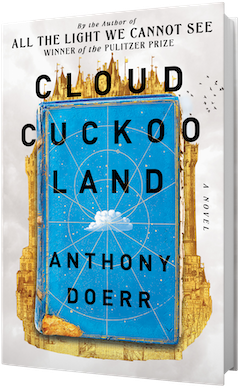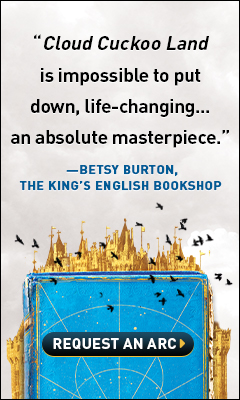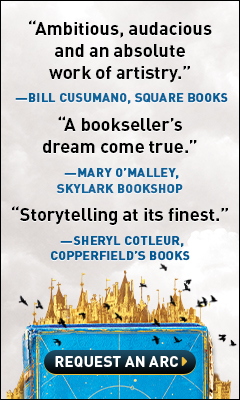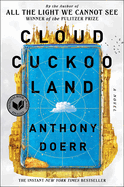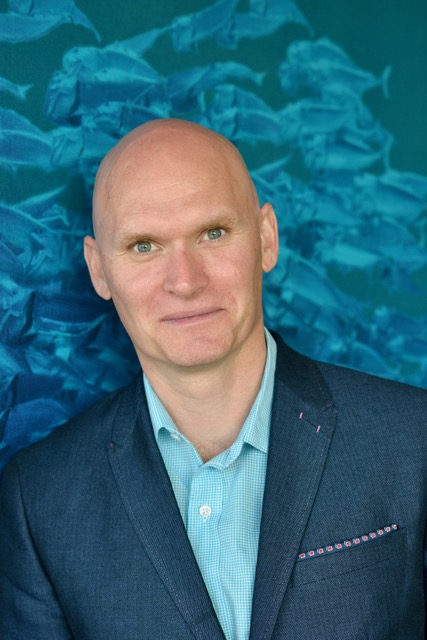Cloud Cuckoo Land
by Anthony Doerr
Cloud Cuckoo Land, Anthony Doerr's highly anticipated follow-up to All the Light We Cannot See, begins in what previous devotees might consider an unlikely time and place: a spaceship partway through a vast interstellar journey to colonize a new planet. In this ambitious, sprawling novel about the necessity of storytelling for people on the edge of catastrophe, Doerr introduces a dizzying array of characters and settings, from Konstance, a 14-year-old passenger on the aforementioned spaceship, the Argos, to young Anna and Omeir, who find themselves on opposing sides during the 1453 siege of Constantinople. Zeno and Seymour are at the center of a kind of modern-day siege in the present, though Doerr also captures their lives long before and after their pivotal confrontation. The characters are connected by the crises they face, which are both personal and civilization-wide, and by their shared appreciation for "Cloud Cuckoo Land," an ancient, fictional tragicomic Greek text about the persistent human drive to escape suffering and find somewhere better.
Except for Konstance, the characters are paired--Anna and Omeir in the 15th century, Seymour and Zeno in the present day--and meet at moments of violent disaster. Anna's already precarious, impoverished life in Constantinople is further threatened by the arrival of Muslim soldiers putting the city to siege, while Omeir and his pack animals are dragooned into service by the Sultan's forces. Cloud Cuckoo Land possesses a fable-like quality, sometimes skipping through characters' lives in a few pages, in a manner reminiscent of the briskly paced but sweeping scope of the titular Greek text. Thus, we are elegantly brought up to speed on Omeir's miraculous survival as a child maligned for his facial deformity and Anna's unlikely adventures smuggling books out of a crumbling building before the siege begins. Doerr's storytelling abilities--and the book's fable-like elements--come to the fore as the siege approaches and Anna and Omeir observe a conflict so large it is almost beyond their comprehension. Doerr describes the impact of an enormous cannon:
"It's as though the finger of God reaches down through the clouds and flicks the planet out of orbit. The thousand-pound stone ball moves too fast to see: there is only the roar of its passage lacerating the air as it screams over the field past Omeir--but before the sound has even begun to register in his consciousness, a tree at the opposite end of the field shatters. A second tree a quarter mile farther also vaporizes, seemingly simultaneously, and for a heartbeat he wonders if the ball will travel forever, beyond the horizon, smashing through tree after tree, wall after wall, until it flies off the edge of the world."
The apocalyptic air created by the siege and the impending sack of Constantinople is echoed in the present by Seymour's growing obsession with ecological catastrophe. Raised in poverty by his mother, as a boy Seymour finds his unusual tendency toward sensory overload soothed by frequent trips into the forest behind his home. When the forest is leveled by developers, Seymour's grief morphs into rage at the toll humanity is taking on the planet. Doerr realistically portrays Seymour's gradual radicalization, eventually resulting in a violent stand-off at a library where Zeno is putting on a play adaptation of "Cloud Cuckoo Land." Doerr does not dismiss Seymour's apocalyptic concerns as overblown--ecological destruction and climate change are treated as very real concerns--but he does use Seymour to illustrate how personal suffering and despair at the state of things threaten to close us off from the parts of our world that are beautiful and precious.
Through it all runs "Cloud Cuckoo Land" itself, long passages of which are quoted in between chapters. On the surface, the story is a relatively light one, tracking one man's humorous search for utopia, during which he suffers multiple indignities, including being transformed into a donkey. The characters discover the story of Aethon's quest in a variety of ways, but it serves for each of them as both a necessary distraction from the suffering around them and an insight into their own search for a place free from pain. Aethon is treated as a fool by many, but his quest for greener pastures is one that recurs in different forms over millennia, from Konstance and the other passengers' search for an unspoiled exoplanet to Zeno's need for a way out of his circumscribed life. Doerr suggests that while this impulse is an understandable human response, it can also stand in the way of appreciating what we already have. There are no utopias over the next horizon, but we do have stories, the miracles of nature, and each other.
Cloud Cuckoo Land is ultimately an optimistic novel about humanity's tendency to teeter on the edge of nothingness. It suggests that the harm people do does not and will not overwhelm their capacity for kindness and bravery. And in Doerr's kaleidoscopic slides between characters and time periods, it argues that stories have the power to bind us together over millennia. For stories to do that necessary work, we must keep them alive with the same dedication as Doerr's characters preserving the fragments of "Cloud Cuckoo Land" against the ravages of time and forgetfulness. --Hank Stephenson



